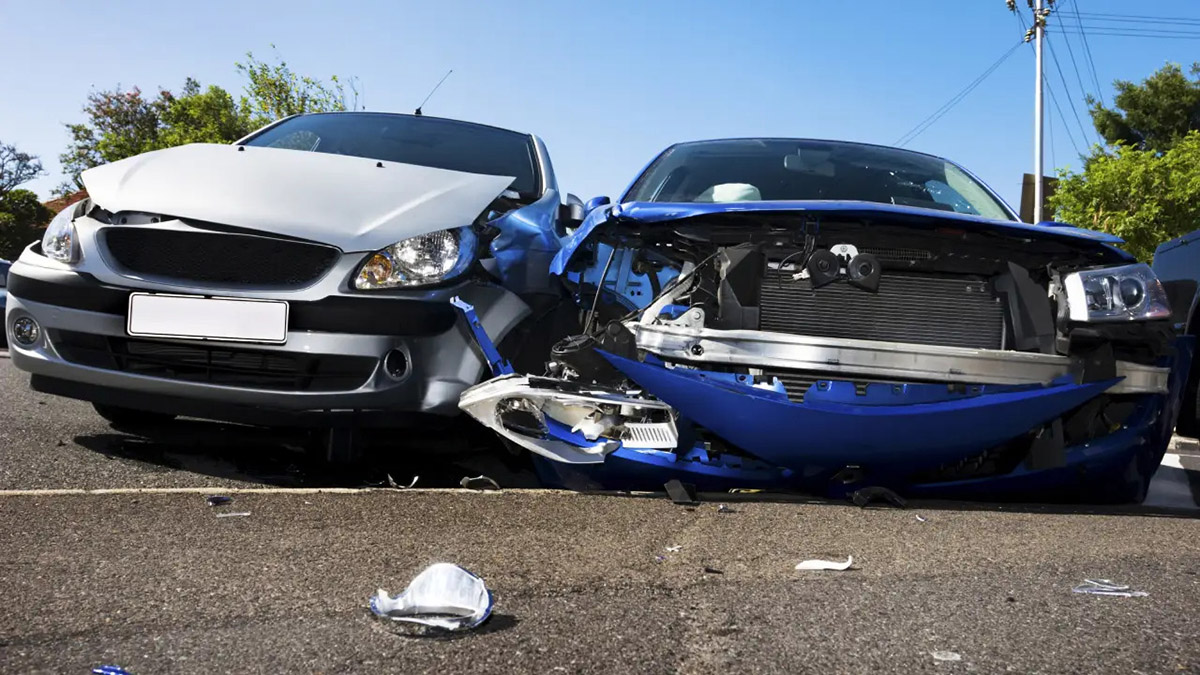Home>Finance>What Happens If I Don’t Call My Insurance After An Accident?


Finance
What Happens If I Don’t Call My Insurance After An Accident?
Published: November 18, 2023
Find out the financial consequences of not contacting your insurance company after an accident. Protect your finances and make the right call today.
(Many of the links in this article redirect to a specific reviewed product. Your purchase of these products through affiliate links helps to generate commission for LiveWell, at no extra cost. Learn more)
Table of Contents
Introduction
Getting involved in a car accident can be a nerve-wracking experience, and it’s understandable if you feel overwhelmed in the aftermath. One of the first steps you should take after ensuring the safety of all parties involved is to contact your insurance company to report the accident. However, what happens if you decide not to call your insurance company? Are there any consequences for not reporting an accident?
In this article, we will explore the importance of adhering to insurance requirements after an accident, the legal obligations surrounding reporting an accident, and the potential consequences of not doing so. We will also discuss how insurance coverage and claims work in the event of an accident, as well as what options you have for resolving an accident without involving your insurance company. Finally, we will touch on the importance of seeking legal advice when dealing with the aftermath of an accident.
It is crucial to remember that the information provided here is not legal advice. Depending on your jurisdiction and specific circumstances, the laws and regulations surrounding accidents and insurance may vary. If you find yourself in a situation where you’re unsure of how to proceed, it’s always best to consult with an attorney who specializes in personal injury and insurance law.
Now, let’s delve into the world of insurance requirements, legal obligations, and the consequences of not calling your insurance company after an accident.
Understanding Insurance Requirements
Before we can explore the importance of reporting an accident to your insurance company, it’s essential to understand the insurance requirements that apply to you. In most jurisdictions, drivers are legally obligated to carry a minimum amount of insurance coverage to protect themselves and others in the event of an accident.
The specific insurance requirements can vary from state to state or country to country, but they typically include liability coverage, which helps pay for damages and injuries sustained by others if you are deemed responsible for the accident. Additionally, collision and comprehensive coverage may be required if you want protection for your own vehicle in the event of an accident or other incidents such as theft, vandalism, or natural disasters.
Insurance requirements are in place to protect all parties involved in an accident, including yourself, other drivers, passengers, and pedestrians. By having the appropriate coverage, you ensure that there is financial support available to cover medical expenses, property damage, and other losses resulting from the accident.
It’s important to review your insurance policy carefully to understand the coverage limits and any additional coverage options available to you. Failure to comply with the mandatory insurance requirements can result in fines, license suspension, or other legal consequences. Additionally, it may have a significant impact on your ability to file a claim and receive compensation in the event of an accident.
Now that we’ve covered the basics of insurance requirements, let’s move on to the legal obligations that arise after an accident.
Legal Obligations After an Accident
When you are involved in a car accident, there are certain legal obligations that you need to fulfill. These obligations may vary depending on your jurisdiction, but they generally include providing assistance to injured individuals, reporting the accident to the appropriate authorities, and exchanging information with the other party involved.
The first and foremost duty is to ensure the safety and well-being of everyone involved in the accident. If anyone is injured, it is crucial to call emergency services immediately and provide any necessary first aid or assistance while waiting for help to arrive.
Once the immediate safety concerns have been addressed, you must report the accident to the appropriate authorities. This typically involves contacting the local police or highway patrol, especially if there are injuries or significant property damage. Reporting the accident serves several purposes, such as creating an official record of the incident and facilitating the investigation process.
Moreover, you are generally required to exchange information with the other party involved in the accident. This information typically includes your name, contact details, driver’s license information, and insurance information. The purpose of this exchange is to ensure that all parties have the necessary information to file insurance claims and pursue legal action if needed.
Failing to fulfill these legal obligations can result in serious consequences. It may lead to legal penalties, such as fines or even criminal charges, depending on the severity of the situation and local laws. Additionally, failing to report an accident to your insurance company can have repercussions on your ability to make a claim and receive compensation for damages.
Now that we understand the legal obligations involved, let’s explore the importance of reporting an accident to your insurance company.
Reporting an Accident to Your Insurance Company
After fulfilling your legal obligations and ensuring the safety of everyone involved, it is important to promptly report the accident to your insurance company. Reporting the accident allows your insurance provider to initiate the claims process and assess the damages and liabilities involved.
When contacting your insurance company, be prepared to provide detailed information about the accident, including the date, time, and location of the incident. You will also need to provide a factual account of what happened and any relevant details, such as the vehicles involved and the contact information of the other party.
It’s essential to report the accident to your insurance company as soon as possible, ideally within 24 to 48 hours. Prompt reporting helps ensure that your claim is processed efficiently and that your insurance company can gather all necessary information while it is fresh.
When reporting the accident, it’s important to be truthful and accurate in your description of events. Providing false or misleading information could jeopardize your claim and potentially result in the denial of coverage.
Once the accident is reported, the insurance company will assign an adjuster to investigate the claim. The adjuster will gather evidence, review any available police reports or medical records, and assess the damages to determine the coverage and compensation you may be entitled to.
Keep in mind that your insurance policy may include specific timelines for reporting accidents. Failure to adhere to these timelines could result in a denial of coverage or complications in the claims process. Be sure to review your policy or contact your insurance agent to understand any specific requirements.
Now that we have discussed the importance of reporting an accident to your insurance company, let’s explore the potential consequences of not doing so.
Consequences of Not Reporting an Accident
Choosing not to report an accident to your insurance company can have a variety of potential consequences. It is important to understand these consequences before making the decision to withhold information.
First and foremost, not reporting an accident to your insurance company can result in a denial of coverage for any damages or injuries that occurred as a result of the accident. Insurance policies typically require prompt reporting of accidents, and failure to do so may be considered a violation of the terms of your policy.
In the event that you decide to file a claim at a later date, your insurance company may deny the claim on the basis that you failed to report the accident in a timely manner. This means that you may be personally responsible for covering all costs associated with the accident, including medical bills, property damage, and legal fees.
Furthermore, not reporting an accident can have long-term consequences for your insurance coverage. Insurance companies rely on claims history to assess risk and determine premium rates. If you have a history of not reporting accidents, your insurance company may view you as a higher risk and increase your premiums or even cancel your policy altogether.
Additionally, some jurisdictions have legal requirements that mandate reporting of accidents to the authorities or insurance companies. Failing to fulfill these obligations can result in fines, penalties, or even criminal charges.
Another important consideration is that if the other party involved in the accident decides to report the incident to their insurance company or pursue legal action, you may be caught off guard without any legal protection or representation. By not involving your insurance company, you are effectively forfeiting their support in resolving any potential disputes.
Ultimately, withholding information about an accident from your insurance company can result in significant financial and legal consequences. It is always best to err on the side of caution and follow the proper procedures for reporting accidents to ensure that you are protected and receive the coverage you are entitled to.
Now that we understand the potential consequences of not reporting an accident, let’s delve into how insurance coverage and claims work in the event of an accident.
Insurance Coverage and Claims
In the event of an accident, insurance coverage plays a crucial role in providing financial protection and assistance. Understanding how insurance coverage and claims work can help you navigate the process more effectively.
When you purchase an insurance policy, it typically outlines the types of coverage you have and the limits of that coverage. For example, liability coverage helps pay for damages and injuries sustained by others if you are found to be at fault for the accident. Collision coverage, on the other hand, helps cover the cost of repairs to your vehicle if it is damaged in an accident.
When you report an accident to your insurance company, they will assign an adjuster to handle your claim. The adjuster will investigate the accident, assess the damages, and determine the coverage and compensation you may be eligible to receive. It’s important to provide the adjuster with all relevant information and cooperate fully during the claims process.
Following the investigation, the adjuster will work with you to resolve the claim either through repairs, reimbursement, or settlement. If you have sufficient coverage, your insurance company will generally handle the financial aspects, including paying for necessary repairs and medical expenses of the parties involved.
It is essential to review your insurance policy carefully to understand the coverage limits, deductibles, and any exclusions that may apply. Some policies may have limitations on coverage for certain types of accidents or circumstances, so it’s important to be aware of these details.
When filing a claim, it’s important to keep detailed records of all communication, receipts, and documentation related to the accident. This includes police reports, medical records, estimates for vehicle repairs, and any other relevant information. This documentation can be instrumental in supporting your claim and ensuring a fair resolution.
It’s also worth noting that insurance claims are subject to a claims process, which may take some time to complete. Be prepared to provide any requested documentation or additional information as needed during this process.
Now that we have covered how insurance coverage and claims work, let’s explore the possibility of handling an accident without involving your insurance company.
Handling an Accident Without Insurance Involvement
In certain situations, you may consider handling an accident without involving your insurance company. This could be due to various reasons, such as minor damages, no injuries, or a desire to handle the situation privately. However, it is essential to understand the potential risks and implications of this approach.
If you decide to handle an accident without insurance involvement, it’s crucial to obtain all necessary information from the other party involved. This includes their contact details, driver’s license information, and insurance information, if available. Gathering this information helps protect your interests and ensures that you have the necessary details for potential legal or financial actions in the future.
Next, you may choose to engage in settlement negotiations directly with the other party. This can involve discussing the cost of repairs or any other damages and coming to a mutually agreeable resolution. However, it’s important to approach these negotiations carefully and consider seeking legal advice to ensure you are being treated fairly and that all aspects of the accident are taken into account.
Keep in mind that without insurance involvement, there is a greater risk of disputes or issues arising down the line. For example, the other party may later claim injuries or damages that were not initially apparent, potentially leading to legal complications or a lack of financial protection.
Furthermore, by handling an accident privately, you may miss out on certain benefits provided by your insurance policy, such as rental car coverage or access to preferred repair facilities. It’s important to weigh the potential cost savings against the benefits and protection that your insurance policy can offer.
It’s worth noting that even if you choose not to involve your insurance company, you may still need to fulfill legal reporting requirements, such as reporting the accident to the appropriate authorities. Failure to comply with these obligations can result in legal consequences.
Ultimately, the decision to handle an accident without insurance involvement should be carefully considered. It’s important to weigh the potential risks and benefits and, if needed, seek legal advice to ensure you are making an informed decision that protects your interests.
Now, let’s discuss the importance of seeking legal advice after an accident.
Seeking Legal Advice After an Accident
After being involved in an accident, it is advisable to seek legal advice to protect your rights and interests. While not every accident requires legal intervention, consulting with an attorney who specializes in personal injury and insurance law can provide valuable guidance and ensure that you navigate the aftermath of the accident effectively.
An experienced attorney can help you understand your rights and legal options, especially when dealing with complex insurance policies or when the other party involved disputes liability or denies responsibility. They can review your insurance coverage, assess the damages, and advise you on the best course of action.
If you decide to pursue legal action, an attorney can assist you in filing a lawsuit against the responsible party. They will handle all legal proceedings, including gathering evidence, negotiating with insurance companies and opposing counsel, and representing your interests in court, if necessary.
Legal advice can be particularly crucial if you or others involved in the accident have sustained significant injuries or if the damages are substantial. It ensures that you receive fair compensation for medical expenses, lost wages, pain and suffering, and other damages resulting from the accident.
Moreover, an attorney can help protect you from potential legal pitfalls. They can offer insight on how to communicate with insurance adjusters, avoid common mistakes that may harm your case, and guide you through any legal complexities that may arise throughout the process.
While legal representation may seem daunting, many attorneys offer free initial consultations to assess the merits of your case and determine if you require legal assistance. This consultation provides an opportunity to ask questions, understand the potential outcomes, and decide whether pursuing legal action is in your best interest.
Remember, each accident and legal situation is unique, and the advice of an attorney can provide valuable insights tailored to your specific circumstances. By seeking legal advice, you can empower yourself with knowledge and protect your rights during the aftermath of an accident.
Now, let’s wrap up our discussion.
Conclusion
Getting involved in a car accident can be a stressful and overwhelming experience. However, it is essential to understand the importance of adhering to insurance requirements and fulfilling your legal obligations in the aftermath of an accident.
Reporting an accident to your insurance company is crucial to ensure that you receive the coverage and compensation you are entitled to. Failing to do so can result in a denial of coverage, potential legal consequences, and difficulties in resolving disputes. It is always best to err on the side of caution and report the accident to your insurance company promptly.
Handling an accident without involving your insurance company may seem tempting in certain situations, but it carries risks. It is vital to consider the potential implications, such as the lack of financial protection and the possibility of complications arising later on. Seeking legal advice can provide guidance and ensure you protect your rights and interests.
Understanding your insurance coverage and the claims process is also crucial. Familiarize yourself with your policy’s terms and limits to ensure you receive proper compensation for damages and injuries resulting from the accident.
In conclusion, it is essential to report an accident to your insurance company, fulfill your legal obligations, and seek legal advice when necessary. By taking these steps, you can navigate the aftermath of an accident effectively and protect your rights and interests.
Remember, the information provided in this article is not legal advice. Laws and regulations regarding accidents and insurance can vary, so it is always best to consult with an attorney who specializes in personal injury and insurance law to obtain specific guidance for your situation.














